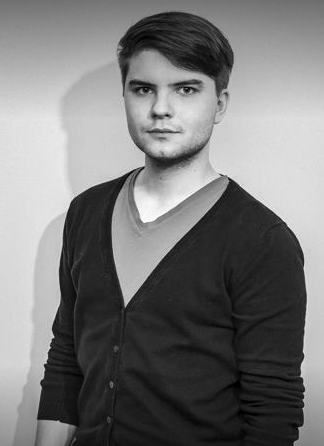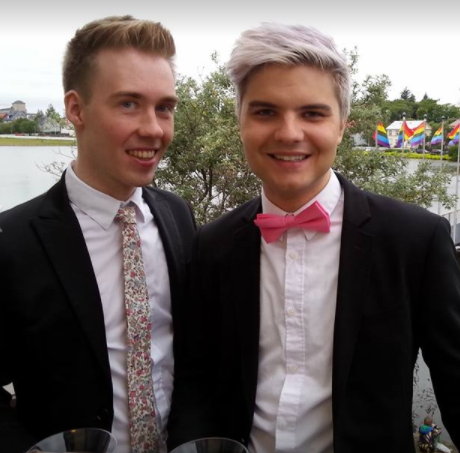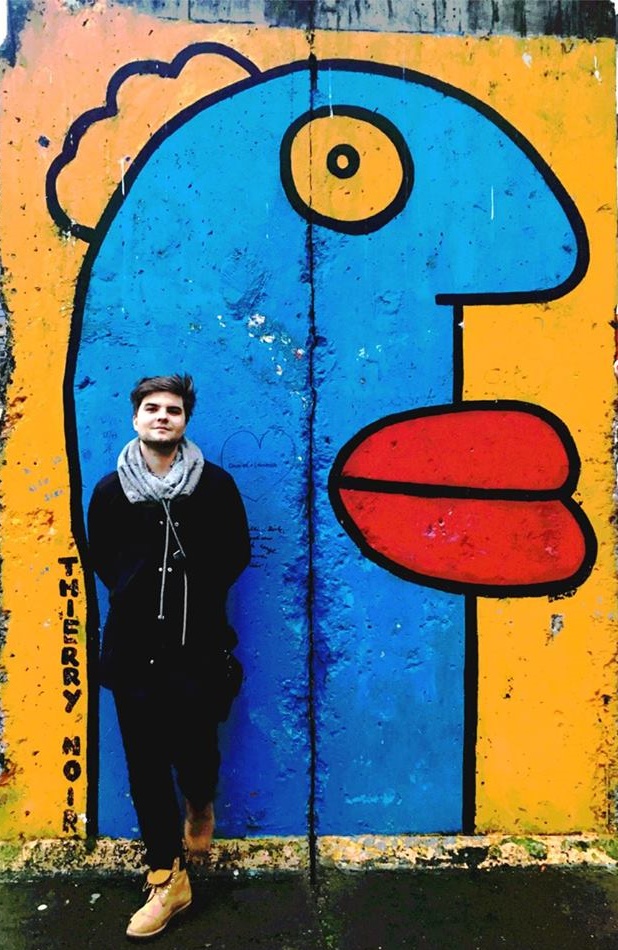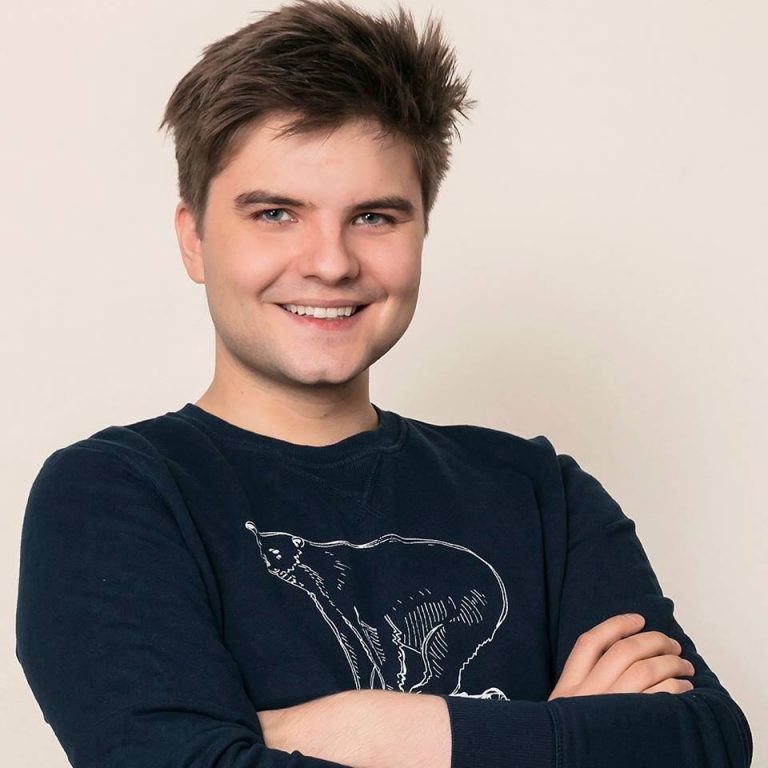Daníel Arnarsson has now been hired as executive director of the National Queer Organisation, Samtökin ’78. Daníel has been active within the organisation since 2014, as well as being politically active in the Left Green Movement, and is in fact one of their deputy members of parliament. GayIceland was curious about the new director: Who is he, where does he come from and what is his vision for the future of Samtökin ’78?

“My name is Daníel Arnarsson. I was born in Reykjavík in 1990, but grew up in Þorlákshöfn, a fishing village on the south coast. I moved to Reykjavík when I went to university in 2010, but now I live in Hafnarfjörður. It was great growing up in Þorlákshöfn and I’m still in touch with people in my village, as I love to visit there and reminisce about old times, since my parents are still living there. I am in a civil partnership with Hólmar Hólm and we have been living together since 2011.
I have been lucky enough to get to work in various fields, but I have been working since I was very young. Mostly in the restaurant and service business, as a waiter, kitchen assistant etc. For a few years, I worked for the Icelandic coffee company Te & kaffi where I got to manage three coffee houses, besides being on their sales and marketing team in 2013.
In later years I have changed fields, being the general secretary of the Left Green Movement from 2014 to 2016, as well as being one of their election campaign managers in 2013 and 2017.”
How long have you been a member of Samtökin ’78?
“I’ve always followed the activities of Samtökin ’78 from the side line, so to speak, but I have not been an active member for long, only joining the organisation in 2014 and immediately offering my services in the advisory council, because I wanted to do my part to help people and be useful. A while ago I saw that the organisation was advertising the job of executive director and decided to apply for it. However, I was not hired at that time. Then it was not until a few weeks ago that I got a phone call where I was offered the job of director, as my predecessor had suddenly quit and I had also been deemed qualified for the job when I applied previously. I must say I was really not expecting that phone call, but I of course said yes without thinking twice.”
“… being a member of a political party and a deputy MP is not a disadvantage, but a bonus as it means that I know how to play in the political landscape and that is a good thing in the organisation.”
Can the members of the organisation expect a change in the emphasis of Samtökin ’78 with you as director?
“I intend to take my time to learn the ropes, speak to the members, and try to draw the big picture of the organisation – what are our values and our role? Where can we expand and where can we scale back? I think directors should certainly put their mark on the organisations they run, but I seriously doubt that I will change the organisation radically, as that is not part of my role, but depends on the members themselves. Needless to say, I’m obliged to respect the course which the board and the annual general meeting of the members set, as well as I possibly can.

Having said that, I must add that there are a few things in the structure, representation and planning of the organisation that I would like to improve upon. Apart from that, I’m eager to hear from all queer people and urge them to participate in open discussion, both to criticize and tell me what they think. We must remember that we are all in this together. My emphasis will then be on professionalism, clarity and the efficiency that lies in simplicity. In my opinion, the small things, that make the whole picture, often matter most.”
What will be your priority as director?
“First and foremost I intend to act professionally and with respect for all queer people. I want to facilitate communication between different groups within the organisation – as well as outside it. My priority will be to streamline the organisation, define it better and review its roles, various as they are.”
You are a deputy member of parliament for the Left Green Movement, how is that compatible with being a director of Samtökin ’78?
“I consider it a valuable experience in the job that is ahead. The battle for queer rights is in essence a battle for human rights and as such the battle is highly political. I think I have learned a lot about dealing with these matters from my work with the LGM. I’m not trying to mask the fact that I have worked for that movement for a long time and hope to stay involved in politics. First and foremost, I mean to work professionally and passionately for the benefit of queer people, regardless of where they stand politically, as it’s of no consequence to me as director. In my opinion, being a member of a political party and a deputy MP is not a disadvantage, but a bonus as it means that I know how to play in the political landscape and that is a good thing in the organisation.”
“The most important thing for me is not to go into the trenches. The worst thing is to be divided from within. Queer people ultimately have to stick together and get things settled, even though we may not agree completely on all things.”
And if you have to take a seat in parliament, what happens then?
“Not much, really. If it so happens that I will be called to sit in parliament it probably won’t be for a long period of time, a week or so at the most, and we, myself and the board, will deal with that as best we can. On top of that, I’m actually the second deputy MP in my constituency so it’s that much less likely to happen frequently. As you can see, I have only been called once so far.”

Your predecessor considered it a challenge for her in this job not to be queer, do you think that matters in this job?
“Yes and no. Queer people are of all kinds and their experiences very different, so it’s hard to say if that matters. The most important thing for us as human beings is to be able to empathise with each other, respect one another’s experience and try to understand those who are different from us.”
Have you been in a position of responsibility for Samtökin ’78 before?
“Yes, I was part of the advisory council for two years and attended a few board meetings in that capacity.”
There have been difficulties within Samtökin ’78 for the past few years. What is your approach to making the organisation more unified?
“The most important thing for me is not to go into the trenches. The worst thing is to be divided from within. Queer people ultimately have to stick together and get things settled, even though we may not agree completely on all things. That did not happen in the BDSM case but we need to fix that rift as soon as possible and I’m willing to work to help reach a good conclusion. Human rights are certainly not a given thing – it can take decades to achieve those rights, but they can be taken away from us with one stroke of the pen. Fortunately, we are stronger together and we should think about the future instead of getting stuck in petty arguments with each other.”


